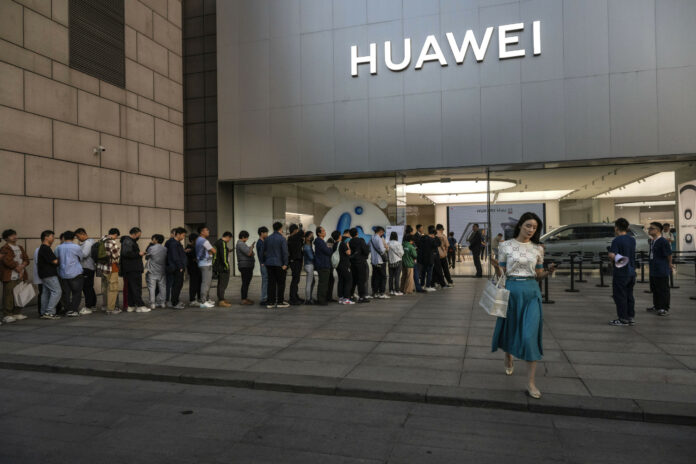American technology curbs against Chinese companies are likely to help China achieve President Xi Jinping’s long-stated goal of self-sufficiency, according to the country’s state media.
The Global Times, a nationalistic Chinese newspaper, reported Sunday on the possibility of further U.S. actions targeting China’s high-tech sector this year, with a particular focus on its ability to manufacture the most advanced semiconductors—computer chips used in everything from smartphones to smart bombs.
Local analysts quoted in the state-owned tabloid said increased U.S. containment efforts, such as the second round of sweeping controls announced last October, could inadvertently hasten the development of domestic technologies in China.
Washington and Beijing have resumed high-level communications through diplomatic and military channels, but the temporary detent, as it was recently described to Newsweek, has not come at the expense of the White House’s long-term goal of ensuring the United States remains several generations ahead in emerging technologies, which include artificial intelligence, biotechnology and supercomputing, among other areas.
Lawmakers in the Congress have demanded increased vigilance in areas where they say cooperative research or American corporate investments have inadvertently strengthened Beijing’s hand by funding Chinese military modernization.
Xi has long pursued self-sufficiency for the Chinese economy despite being critical what he calls Western attempts at decoupling. Beijing’s goal is economic stability and to avoid chokepoints in critical supply chains, which it ultimately would like to control.
Chinese-made chips may account for 30-35 percent of its domestic consumption this year, the Global Times said.
The U.S.-China tech war comes at a time when the semiconductor industry is shifting away from a reliance on China for low-end chips, and as the U.S. seeks to recapture or prevent a further erosion of its stake in the high-end technology valuable chain.
The Commerce Department’s most recent chip controls, along with the Netherlands’ canceling of export licenses under American pressure, were examples of the ongoing strategic rivalry.
Kevin Frayer/Getty Images News/WireImage
Xiang Ligang, director-general of the Information Consumption Alliance’ a Beijing-based telecommunications industry association’ told the Global Times that the U.S. was seeking to suppress and contain China’s advancements. In a way, the Biden administration has said as much. In December, Commerce Secretary Gina Raimondo confirmed that additional curbs would hit the Chinese tech industry in 2024.
Beijing has dismissed the U.S. rationale based on national security concerns, but has yet to launch effective countermeasures. It has, however, slowly laid the ground work to potentially hurt American companies at the source, by potentially choking off U.S. access to rear earth elements and other critical minerals needed in the manufacturing process.
Meanwhile, companies like Huawei continue to innovate despite the technological restrictions. China’s national champions last year released a domestically popular flagship smartphone made predominantly with Chinese components, including an advanced 7-nanometer processor developed by Chinese chipmaker SMIC—an possible breakthrough.
Miles Evers, a political scientist at the University of Connecticut, believes the likes of Huawei have achieved a high degree of self-sufficiency, according to an analysis on Sunday published in Lawfare, a specialist legal affairs website.
Industry experts expect SMIC will soon mass-produce its new chip—an indication of commercial success—with some even anticipating further advanced in more powerful chips, Evers wrote.
Chinese scientists were also securing their future in chipmaking through a surge in patent filings, laying the groundwork for the next generation of technological achievements, he said.
Uncommon Knowledge
Newsweek is committed to challenging conventional wisdom and finding connections in the search for common ground.
Newsweek is committed to challenging conventional wisdom and finding connections in the search for common ground.


